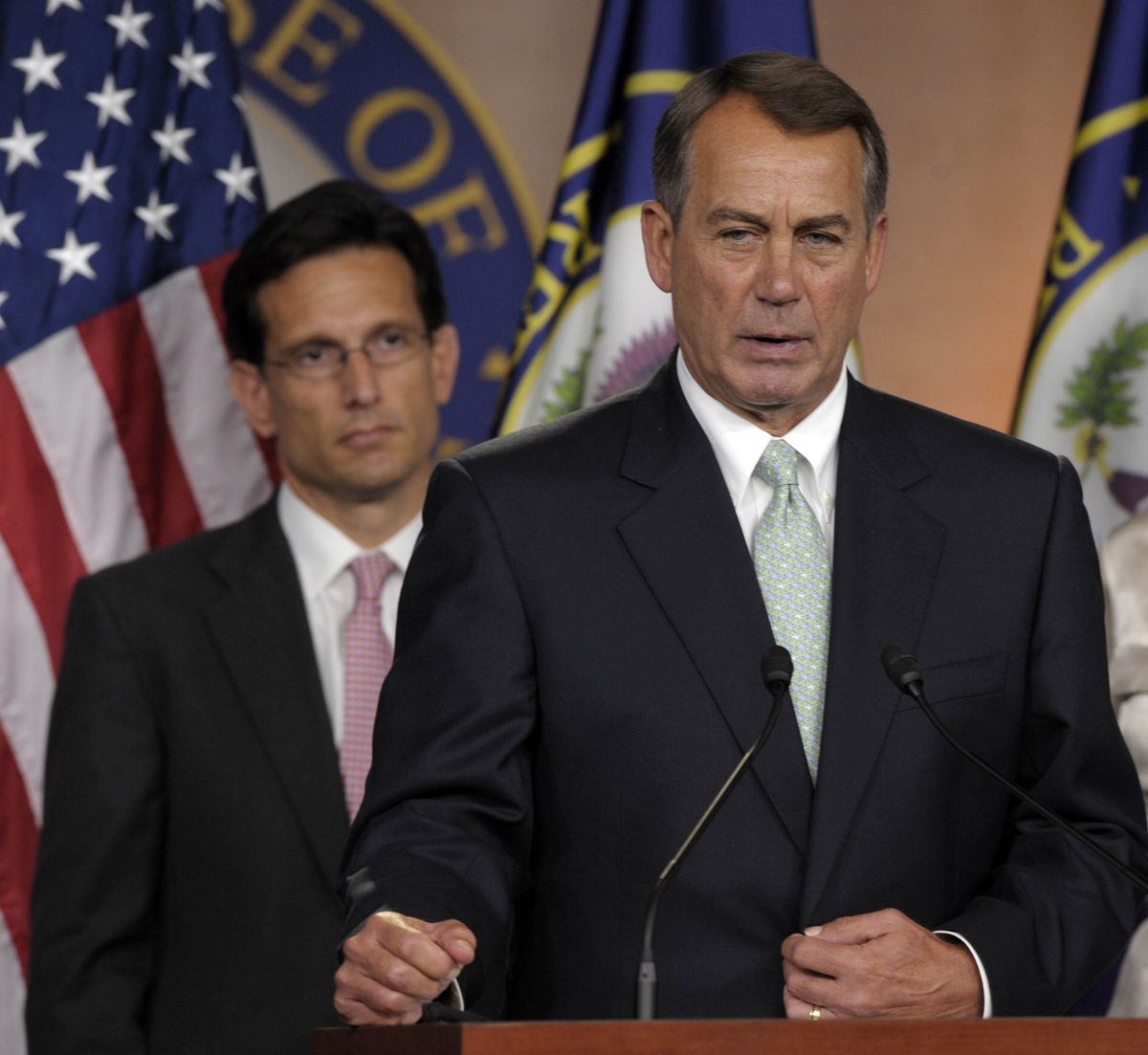House GOP splits over compromise
Veterans would OK a winning deal, but newcomers steadfast

WASHINGTON – There are two types of Republicans in the House of Representatives: the no-compromise bloc of die-hard conservatives, and the old guard who consider getting 80 percent of what they want to be a pretty good deal.
The two sides rarely clash in public, but the schism is clear.
“I’m a conservative. I’m also an institutionalist. I want to see this place work,” said Rep. Dan Lungren, R-Calif., who first came to Congress as a staff member in 1969.
But freshman Rep. Allen West, R-Fla., wants bold action now. “I’ve never been worried about being blamed for stuff as long as I stick to my principles,” he said. “I didn’t come here to kick the can 10 years down the road.”
These differences in outlook could have a huge impact on resolving the impasse over how to cut federal spending while increasing the nation’s $14.3 trillion debt limit. If that limit isn’t raised by Aug. 2, the government risks default on its obligations. Treasury officials, business leaders and financial experts warn that economic chaos could result.
The key to passing a deal is the House, where Republicans have a 240-192 majority, with 218 needed for passage. House Majority Leader Eric Cantor, R-Va., leader of the new-breed conservatives, has been the most visible negotiator, drawing attention not only for his hard line against higher taxes but also for his aggressive style. House Speaker John Boehner, R-Ohio, has shown more inclination to compromise.
The two men embody the House GOP’s factions. Michael Franc, the vice president for government studies at the Heritage Foundation, a conservative research center, said House Republicans could be grouped loosely into those elected before 1994 and those who came after.
The pre-1994 group, which includes Boehner, who was first elected in 1990, arrived in an era when Democrats had controlled Congress since the mid-1950s. House Republicans’ voting records were firmly conservative, but legislative success for them usually depended on working with Democrats.
Then came 1994, when 73 freshman Republicans were swept into the House after running on the “Contract with America,” a conservative ideological agenda championed by Newt Gingrich, R-Ga., who was House minority whip. The GOP won control of the House for the first time in 40 years, and Gingrich was elected House speaker.
Last year the conservatives rose again, as 87 Republican freshmen were elected, many with the backing of the tea party movement. The party regained control of the House for the first time in four years.
“People who got elected in 2010, they weren’t shy about their campaigns. They weren’t shy about what they believe,” said Sen. Lindsey Graham, R-S.C., who was first elected to the House in 1994 and is known for his occasional willingness to find common ground with Democrats.
Many freshmen feel pressure to resist raising the debt ceiling unless they also get significant long-term spending cuts. They think that “we shouldn’t go home and say ‘All right, we’ve raised the debt ceiling but nothing really changed,’ ” Graham said.
Yet because seniority matters in the House, most committees are run by lawmakers who were first elected before 1994. And they often see the younger hard-liners’ desire to slash government across the board as too facile.
“Cutting spending is hard work. That’s why we have committees,” said Lungren, chairman of the House Administration Committee.
The old guard also came up in a system in which it was important for committee chairmen to find consensus among their panels’ members after holding hearings and debating issues, then present unified views to the rank and file in the full chamber. That code has eroded in recent years.
“Committee chairs would have weighed in and some kind of responsible position would have been found,” said Burdett Loomis, a professor of political science at the University of Kansas. “Not today. And this, of course, makes any kind of bargaining incredibly difficult, almost impossible.”
The new conservatives are often impatient. They see any vote for a higher debt limit as a fresh license to keep spending.
Rep. Paul Broun, R-Ga., has proposed lowering the debt limit to $13 trillion from $14.3 trillion. He said that would “force politicians in Washington to make the cuts to our budget that our economy desperately needs.”
House Republicans are considering whether to debate a balanced budget amendment to the Constitution soon, a plan that’s likely to be defeated if they bring it up. But it’s worth trying, said House Republican Conference Chairman Jeb Hensarling, R-Texas, because “these are not ordinary times. These are extraordinary times, and they demand an extraordinary remedy.”
At the moment, it’s hard to find a lawmaker who’ll discuss the GOP split publicly. Boehner and Cantor appeared Thursday with a dozen other House GOP leaders, saying that they were all, as Cantor put it, “on the same page.”
Publicly, they are. However, small signs suggest that the veterans are willing to compromise, while none indicates that the new breed is.
One promising way to end the deadlock is a plan pushed by Senate Republican leader Mitch McConnell of Kentucky. It would empower the president to raise the debt limit without Republican involvement, although it wouldn’t necessarily yield spending cuts. Boehner said last week that he could support it as a last-ditch maneuver.
But West, like many conservatives, hates the idea. “That dog don’t hunt,” he said.